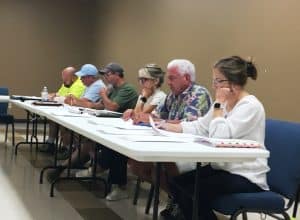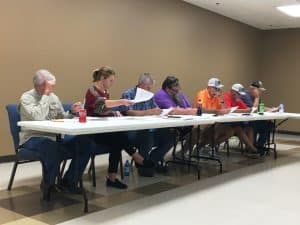News
September 10, 2024
By: Dwayne Page
The Smithville beer ordinance will remain unchanged!
During Monday night’s regular monthly meeting, the aldermen voted 3 to 2 against amending the city beer ordinance to eliminate the 400-foot distance requirement between a church or school and businesses seeking an on-premises consumption permit. Had it been approved the ordinance amendment would have only applied to the C-2 zone which is the downtown business district and none of the other existing regulations in the ordinance would have been changed.
Alderman Jessica Higgins made a motion to approve the amendment removing the 400-foot distance requirement and Alderman Danny Washer offered a second to the motion, but they were the only two who voted in favor. The remaining three Aldermen, Donnie Crook, Beth Chandler, and Shawn Jacobs voted against changing the ordinance.
Prior to the vote Mayor Josh Miller explained that he had recently asked Election Administrator Dustin Estes if this issue could have been placed on the ballot in the form of a referendum. Estes said he contacted the state and the answer was no.
Under the existing ordinance, the language states that “In no event will a permit be issued authorizing the manufacture or storage of beer, or the sale of beer within 400 feet of any school or church. The distance requirement shall be measured in a straight line from the primary entrance of the establishment seeking a permit to sell beer to the primary entrance of the school or church”.
Had the amendment removing the distance requirement been adopted on first reading, a second reading would have been required followed by a public hearing at the next meeting of the mayor and aldermen. With the measure having been defeated on first reading, the issue is dead for now.
Some business owners downtown who sought a change said the existing beer ordinance with the distance requirement is unfair to those who would like to apply for a city beer permit but can’t because they are within the 400-foot boundary. Currently, two businesses downtown have permits to sell beer but one of them got their license through the state for the sale of high gravity beer.
Downtown businessman Tony Luna, who raised the issue with the mayor and aldermen in June, again addressed them Monday night. Luna was one of four people to speak during the public comment period.
“It’s about fairness,” said Luna. “We, the downtown business owners are committed to revitalizing our downtown area and there are key strategies that we believe will help us survive and thrive rather than merely making our businesses a hobby. Number one is to extend the business hours. We need to create compelling reasons for business owners to stay open later. Currently, downtown largely shuts down at 5 p.m. but events like First Friday have shown great success in attracting visitors. Removing the 400-foot ordinance could attract more businesses which would mean all of us could stay open later. This would create a more inviting environment for businesses to come to our downtown area,” explained Luna. “I have been working closely with the county commission to raise the bed (hotel/motel) tax from 5 to 8%. This increase would project and generate approximately $125,000 annually for advertising. These funds would attract more visitors, increase tax revenue, and ultimately provide greater financial benefits for all business owners enabling us to enhance and grow our businesses even more,” Luna continued. “We all benefit from removal of the 400-foot ordinance. The state laws have already changed. We can already get beer (through the state). We can already get whiskey or whatever you want downtown (through the state). We just want to match what the state is doing so we can get domestic beers and do what we need to do downtown. It just brings us up to date,” said Luna.
Ken Fennell also asked the aldermen to adopt the amendment removing the 400-foot distance requirement. He and his wife own a business downtown. “All we are talking about is regular beer,” said Fennell. “The state regulates alcohol. The state regulates wine. The city cannot control that. A bourbon whiskey bar can go on any corner, any building downtown at this moment as long as they comply with the state requirements. The current city ordinance isn’t balanced. Its frankly unfair,” said Fennell. “Some places we can have beer. Other places can’t solely based on an inconsistent imaginary line so to speak. Most rural counties and cities are struggling with aging infrastructure and costs. The costs of construction and labor is up 35% in just over three years’ time. Individual cost of living for families is at an all-time high. City residents and small business owners don’t want higher taxes, property taxes, or whatever to pay for aging infrastructure. We need to find ways to pay for that to bring more revenue into the city. Smithville is losing revenue daily to Sparta, McMinnville, Cookeville, Gainesboro, you name it. Carthage as well. Not just from weekenders that come to the lake but others too that maybe want to go to a place like Collins River to have some barbeque and a beer. We go down there and spend 60 or 70 dollars and then walk around and maybe buy a couple of things at the shops down there. The next thing you know we’ve spent $100 which probably paid for that waitress’s salary, that cook’s salary, that dishwasher’s salary. They in turn buy groceries in that town and in that county. That money never comes back up here. We’re losing out on that every day. It’s simple economics. Spend the money here in the city, the money stays in the city and it circulates without impacting business owners and residents in the future with taxes or other things. How can we expect Smithville to stay relevant in today’s economy while holding onto the past? Please remove obstacles such as this that diminish our ability to meet our fullest potential in the downtown district,” said Fennell.
Graden Kirksey, pastor of the Refuge Church on the public square downtown, spoke against changing the beer ordinance.
“I am a lifelong resident of Smithville and my whole life its always been understood that we wouldn’t have these types of sales close to churches and schools because of the kids, because of families. That’s where they congregate,” said Kirksey. “That’s the main clientele and I’d be willing to bet if you took a poll from the voting public they would overwhelmingly still agree with that whether they drink or not. Outside of schools and church service times, our square is one the biggest hotbeds for families to be able to come and congregate and this would change the culture of the town. Once you make that type of allotment it changes the types of businesses that are interested in being on the square and that potentially changes the whole culture of the square and makes it less family friendly,” continued Kirksey. “Its my understanding that everybody that moved in a business over there (downtown) wanted this to be a family friendly area for people to be able to come out with the kids and have a good time and enjoy themselves. I think this is a step backwards. If this is a city ordinance and you make an exception for one pocket because certain businesses and certain business owners want it if I was somebody outside of that pocket, I’m salivating at the thought of you passing this and just daring you to tell me no when it comes back around. You can’t put the genie back in the bottle or the toothpaste back in the tube. It opens the door for the whole city. You can’t say you agree it shouldn’t be around schools and kids and make an exception when it’s a certain area. I, for one do not think its good for something like this to be in an area where families and kids are coming to congregate regularly,” said Kirksey.
Bruce Malone, a resident of Dearman Street, also expressed his opposition to a change in the city beer ordinance.
“My opinion is I don’t think its going to benefit the city economically that much. My biggest issue is approving this matter in my opinion would be granting special privileges. I’m sure most of these people who bought property (downtown) had the idea of opening a business. I’m very sure they did their due diligence and knew what the situation was before they bought the property and before they opened the business. You start doing special favors for one group I think you have to do special favors for everybody. I just don’t see this as an advantage to the city or the people of the city. All I see is it benefitting two or three business owners and even that I think would be very little,” said Malone
In other business the aldermen awarded a paving bid to Copeland of Cookeville for $109.90 per ton. It was the least expensive of the three sealed bids submitted. Mayor Miller said the city has $100,000 budgeted this year for street paving and he would like for it to begin before cold weather gets here. The other two bids were from Tinsley Asphalt of Tullahoma for $113 per ton and Rogers Group at $112.75 per ton.
The aldermen also approved Mayor Miller’s reappointment of citizen members and aldermen to various city boards including the following:
Planning Commission- Brandon Miller and Glen Nichols
Beer Board-Chase Collins
Board of Zoning Appeals- Caleb Gash and Eddie Hobson
Smithville Electric System- Hilton Conger
The aldermen were also reappointed as head of the following city departments:
Donnie Crook-Sanitation
Danny Washer-Water and Sewer and Vice Mayor
Beth Chandler-Finance
Shawn Jacobs-Police and Fire
Jessica Higgins-Streets and Safety
No changes were made on the city airport committee, 911 board, or industrial board.
Two men arrested after Cocaine and Meth were found in their vehicle
September 9, 2024
By: Dwayne Page
Two men found with cocaine and methamphetamine in a vehicle last week are scheduled for court September 26.
47-year-old Jimmy Lane Estes of Tommy Harrell Street, Smithville is charged with possession of a schedule II-controlled substance (cocaine) with intent to manufacture, sell, or deliver. His bond is $100,000.
55-year-old Michael Lynn Vance of Highland Street, Smithville is charged with possession of drug paraphernalia, simple possession of a schedule II-controlled substance (methamphetamine), and possession of a schedule II-controlled substance (cocaine) with intent to manufacture, sell, or deliver. Vance is under a $112,500 bond.
Sheriff Patrick Ray said that on September 5 after Estes gave deputies consent to search his vehicle, 70 grams of a white powdery substance believed to be cocaine was found locked in a passenger side pocket facing the rear.
A black backpack on the front passenger side floorboard was also searched that Vance claimed belonged to him and next to it were a red straw with residue, a weighted scale with residue, and a glass pipe with 0.14 grams of a crystal-like substance believed to be methamphetamine.
35-year-old Anthony Wayne Tramel of Kings Court, Smithville is charged with possession of a controlled substance with intent to manufacture, sell, or deliver; prescription drug fraud; and possession of drug paraphernalia. His bond is $42,500 and he will be in court on September 19.
Sheriff Ray said that on September 5 a deputy assisted officers of the Tennessee Department of Probation and Parole in a search at Tramel’s home. There they found a clear container that held 4- three quarter pills believed to be Buprenorphine along with several baggies and a scale. Tramel allegedly said those items belonged to him. The search also turned up several prescription bottles containing pills with someone else’s name on them. Tramel could not produce a prescription but said the pills belonged to him. Officers also found several glass and metal pipes with residue, baggies with a crystal-like substance, straws with a white powdery like residue, needles, a scale with residue, a spoon with a burnt residue, and a scale with a crystal-like substance. Tramel allegedly claimed ownership of the paraphernalia.
36-year-old Jonathan Mark Beacham of Bell Road, Antioch is charged with simple possession of a schedule II drug. His bond is $3,000 and he will be in court September 19.
Sheriff Ray said that on September 5 Beacham was found in possession of 0.45 grams of a crystal-like substance believed to be methamphetamine.
55-year-old Jeffery Lee Bates of Frazier Avenue, Smithville is charged with public intoxication. He is under a $2,000 bond and he will make a court appearance September 19.
Sheriff Ray said that on September 4 a deputy was dispatched to the 700 block of Old West Point Road where a man was reported to be screaming and swinging his arms. Upon arrival the officer confronted the man, Bates who was sweating profusely and his eyes were dilated. According to the deputy, Bates could not focus on the conversation, but he did admit to having consumed a beer earlier. Bates was placed under arrest.
Committee to Consider Pros and Cons of Implementing County Powers Act
September 8, 2024
By: Dwayne Page
Is it time for the county to renew an effort considered last year to establish regulations under the “County Powers Act” for oversight in the development of certain land uses?
The Health Education and Public Welfare Committee of the County Commission will meet to discuss the pros and cons on Monday, September 16 at 6 p.m. in the lower courtroom of the courthouse.
Outside the four cities, the county currently has no zoning or other regulatory authority to prohibit, limit, or oversee development of any land uses including for quarries, cell towers, pallet yards, junk yards, chicken farms, etc.?
The issue was raised last summer when residents on Nikki Lane off Highway 70 east in the Midway Community came to the county commission complaining about having to put up with the stinky, unsightly and unsanitary condition of a neighbor’s unkempt property. The residents wanted something done about it but there was little the county could do without regulatory power. At the same meeting, the commission learned of a business on Highway 53 at Liberty which at that time had been conducting a regular burning of wooden pallets sending plumes of smoke into the air for hours. In one case, heat from the fire damaged utility lines and the thick smoke spread throughout the community affecting residents and livestock.
Because of those complaints, the county commission entertained the idea of adopting the “County Powers Act” but when it came time to act, the commission voted 8-6 to remove it from the agenda. That was in August, 2023.
To enact the “County Powers Act”, the county commission must adopt a resolution by two thirds vote as well as a resolution to establish and enforce regulatory standards regarding health and safety conditions of residential and non-residential properties within the confines of DeKalb County outside the boundaries of the municipalities which already have codes and ordinances.
The “County Powers Act” issue had not been addressed since last August until residents in the Snow Hill Community recently discovered that a rock quarry operation had moved into the neighborhood without their knowledge and came to the county commission last month to complain about it. Last week, residents in the Liberty and Alexandria area learned that another company is planning to develop a rock quarry in their neighborhood.
The idea behind the “County Powers Act” is to prevent or eliminate dangerous and or unsanitary conditions resulting from overgrown vegetation, accumulation of debris, trash, litter, and garbage, or the presence of vacant dilapidated buildings or structures. Although DeKalb County currently has no zoning regulations in place, the “County Powers Act” gives counties, without establishing zoning, the authority to set and enforce standards for county property owners with respect to nuisances and other practices deemed detrimental to their neighbors.
However, according to the County Technical Assistance Service (CTAS) website, there are limitations under the “County Powers Act”.
“The law exempts certain businesses and practices from regulation. The powers conferred upon counties by T.C.A. § 5-1-118(c) do not apply to the following activities which are regulated under other provisions of general law: sale of beer and alcoholic beverages; wholesale of beer; surface mining; production of oil and gas; activities covered by environmental protection laws and regulations dealing with air pollution, atomic energy, solid waste disposal and management, landfills, hazardous waste management, petroleum underground storage, oil spill cleanup, dry-cleaning, water, wastewater and sewerage; water management; wells; and dams. Additionally, T.C.A. § 5-1-118(b) provides that counties may not use these powers to prohibit or regulate normal agricultural activities”.
Still, residents with concerns want the county to do something.
“If county government doesn’t yet have the will to embrace zoning, I urge you to reconsider the County Powers Act as a means of establishing and enforcing standards to protect residents in this county and against exploitation and nuisances in the future,” said Michael Antoniak, a resident of the Snow Hill community during last month’s county commission meeting. “I believe adopting the County Powers Act would be a good and necessary first step and I urge you on behalf of all my neighbors to revisit this,” he said.
« First ‹ Previous 1 56 64 65 6667 68 76 166 2461 Next › Last »






















